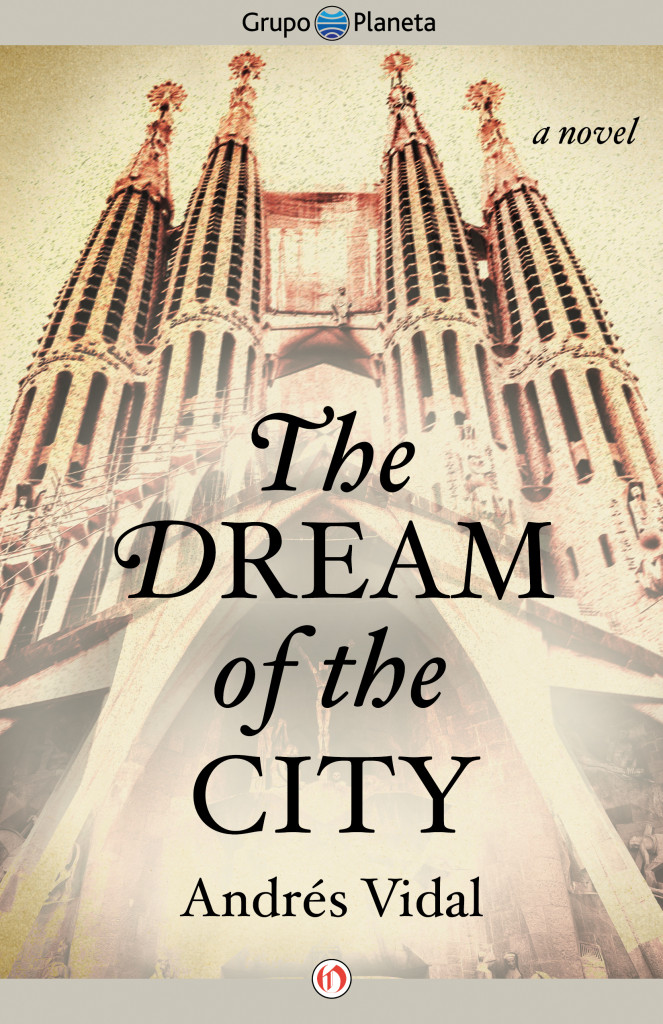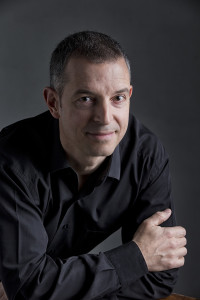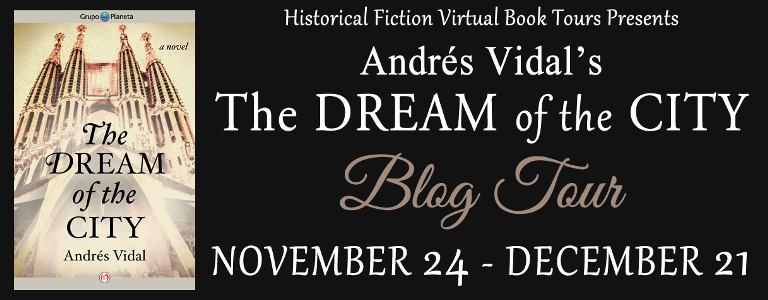 The Dream of the City
The Dream of the City
by Andrés Vidal
Publication Date: November 24, 2015
Open Road Integrated Media
eBook; 557 Pages
Genre: Historical Fiction
Part love story, part chronicle of the modernist years of Barcelona and a society about to change irrevocably, The Dream of the City is an homage to the genius of the Catalan architect Antoni Gaudí (1852-1926)—an exciting historical novel in which we tour the most bohemian parts of Barcelona.
In Barcelona, at the beginning of the 20th century, the destinies of two families, the Jufresas and the Navarros, converge: Francesc Jufresa is the head of the bourgeois family which runs the most renowned goldsmith workshop in the city. His daughter, the beautiful Laura, rejects the limited future of a housewife and mother to work with the brilliant Gaudí on the sculptures for the Sagrada Familia. Juan is the head of the Navarros, a poor family whose members must work hard to survive. Dimas, the first born, embodies his father’s hopes and resents the dangerous and ill-paying work of a streetcar mechanic. When the independent Laura and the ambitious Dimas meet, the encounter will change their lives forever.
AMAZON (KINDLE) | BARNES & NOBLE (NOOK)
About the Author
Andrés Vidal is the pseudonym of Marius Molla. He is the author of two other novels that were successes in Spain: Inheriting the Earth (2010) and The Dream (2012). By training the author is an industrial engineer in Barcelona. Follow Andres Vidal on Facebook.
Blog Tour Schedule
Tuesday, November 24
Spotlight & Giveaway at Unshelfish
Wednesday, November 25
Excerpt at To Read, or Not to Read
Friday, November 27
Excerpt & Giveaway at One Book Shy of a Full Shelf
Monday, November 30
Review at Beth's Book Nook
Tuesday, December 1
Excerpt at So Many Books, So Little Time
Thursday, December 3
Spotlight at CelticLady's Reviews
Friday, December 4
Interview at Dianne Ascroft Blog
Spotlight & Giveaway at Teddy Rose Book Reviews Plus More
Monday, December 7
Spotlight at A Literary Vacation
Monday, December 21
Review at Luxury Reading
Review at Just One More Chapter

CHAPTER 1
Ten years later, the big city,
darkened with shadows, passed again before Juan de Navarro's eyes. It was a
winter evening in 1914 and the streetlights of the main streets downtown
glimmered like fireflies above the cement. Streetcar line 46 was moving toward
Horta. The pedestrians were indifferent to the machine that would shoot off the
occasional spark. Juan found it impossible to look away from the passing
landscape; how it had changed in recent years. In the meantime, the streetcar
continued gliding over the iron tracks almost without a rattle. That day, the
first of March, was coming to a close, with little light remaining on the
horizon where the beautiful, jagged massif of Collserola rose up. Juan
remembered then the Sundays in the past when he used to go up there, amid the
smooth, slanting limestone and the cane apple trees, to enjoy a picnic in the
countryside and the glorious view the location offered. When his family was
normal, of course.
A boy with his hands in his pockets
and a beret covering the better part of his head smiled at him. Juan returned
the gesture with his one still-useful hand. Soon he would arrive at the ancient
town of San Martín de Provensals, now a part of Barcelona thanks to the plan
thought up by Ildefons Cerdà the century before. When Juan began to think of
all the changes he'd seen, he couldn't help but feel that his life was turning
in the opposite direction; while the city seemed to know no limits to its
growth, he felt smaller and smaller all the time. Since Carmela had left him
twenty years back, his life had been in constant collapse.
After passing the intersection of
the Avenida Argüelles and Calle Valencia, Juan stood up. Despite his tall
stature, it was hard for him to make his way through the people, who were so
tightly packed in the streetcar that the cold could scarcely penetrate inside.
The ticket taker looked at him askance before his eyes came to rest on a boy
who was pressing the fifteen cents for the ticket into his hand. Juan knew very
well that the man disapproved of the free access that the veteran drivers
conceded him, but he didn't put up a fight.
He approached the conductor's post
to say good-bye. Carles had been his coworker until the accident and was also
one of the most strident voices among those who clamored for him to receive a
pension. Though it never did arrive, at least he could travel for free on the
lines where his old friends were in charge.
"See you tomorrow, Carles. And
thanks," Juan said, raising his corduroy cap. He uncovered a nest of
chestnut hair with a glimmering bald spot at its center.
"See you later, Juan. Tell your
son not to come in late. Things are getting rough down in the bays and he
doesn't want to end up looking bad."
"I'll tell him, for his sake
and mine," he answered.
Dimas was still working in the
repair shop. The idea that his son might lose his job gave Juan an empty
feeling in the pit of his stomach. While he got lost in these thoughts, his
hand caused the coins in his pocket to jingle: six reales he'd been paid
in Doña Inmaculada's textile store. From time to time, friends from the
neighborhood would send Juan on little errands that served more to keep Juan
feeling useful than to earn him money. It had been a while since he'd mentioned
these chores to his son. The boy saw it as taking alms, and he wasn't exactly
wrong: That day, Juan had made one and a half pesetas carrying packages up and
down through the city nearly the entire day, a pittance compared to what he'd
made as a conductor ten years back. Moreover, if he did make it to the end of
the month, it was only because he didn't pay for the streetcar. No one would
hire a man with only one good arm, and his chance for a job was even less with
the flood of immigrants constantly flowing into the City of Counts. Juan
resigned himself to what the present offered, and that was better than nothing.
With worry accompanying his steps,
Juan descended from the streetcar. The stop had been inaugurated only recently,
just beside the Sagrada Familia, perennially under construction. His other son,
the eight-year-old Guillermo, went to school nearby. When he looked up, he saw
the church scaffolding was empty: the workers had already gone home. At that
moment he couldn't help but solicit a bit of help from that supreme being who
dwelled between the incomplete towers driving into the sky. Juan left behind
the vacant lot that surrounded the future basilica and walked along the Calle
de Mallorca until he crossed the Calle Igualdad. That was where he lived.
He began his trek up to the top
floor, his breathing heavy. At fifty-two years of age, his weary legs couldn't
hold up the way they had when he and Carmela first arrived in the city. It had
been impossible to make a living in his village, and they had emigrated together.
Back home, people spoke of the wonders of Barcelona; they said it was full of
opportunities, and it was true that he'd found work as soon as he got there.
The misfortunes would come later: The city, like a riled beast, had revealed
its ruthless claws.
The wooden steps now creaked beneath
his threadbare shoes. There weren't many floors to climb, only four, but Juan
had to stop and rest a moment on each landing to catch his breath.
"Father!" Guillermo
exclaimed from the hallway. He ran to Juan when he heard the door of their tiny
apartment — just two barely furnished rooms — open.
Juan took off his cap and jacket and
left them on the rack at the entrance. He kissed Guillermo and asked after
Dimas.
"He's in his room,"
Guillermo said, referring to the bedroom the two brothers shared. "He just
got home."
The boy wasn't really Juan's; he
belonged to his brother, Raúl, who had suffered the worst consequences of the
Tragic Week in 1909. His wife, Georgina, the one the boy owed his blond hair
and blue eyes to, had gone along with Raúl during the wave of protests against
the conservative government of Antonio Maura between July 26 and August 2. Once
again, it had been the poorest of the poor who were called upon to maintain
control of the Moroccan Protectorate in the Second Rif War. The war had been a
folly of the Spanish administration, still stinging from the loss of Cuba and
the Philippines only a few years before.
Men and women raised barricades and
faced off against the ruling powers in the streets of Barcelona. The Catholic
Church was also affected: convents, churches, and schools were burned to the
ground by the hands of an enraged populace. Martial law and a state of war were
declared inside the city.
The conflict ended after a fierce
repression: more than eighty were dead, nearly two hundred were sent into
exile, and seventy life sentences were meted out. The unions and the secular
schools were closed down indefinitely. The iron hand tightened its grip on the
working class and the more liberal sectors of society.
To Juan, it seemed like it was only
yesterday that he'd gone to the police station to pick up Guillermo, then only
three, his cheeks red with mourning. From that moment on, the boy had no one
but him and Dimas.
"Help me make dinner,"
said Juan. "That way you can tell me how your day at school went."
Guillermo agreed with a smile and
took his place beside him in front of the charcoal stove. Juan didn't want to
bother Dimas; he thought he must be very tired from work. He would let them
know when he was ready.
With the remaining potatoes and
carrots from the pantry, father and son made a soup to be accompanied with a
large loaf of bread. Guillermo talked continuously about the lessons he'd been
taught that day by Father Flotats and Juan poured the broth into the bowls —
with great effort he had learned to get by with his left hand. The little one
said he had been the first in the class to be able to add four rows of numbers
and that they had given him a prize for his good handwriting. Juan
congratulated him. Guillermo's intelligence was nothing new; Juan had watched
the boy grow and seen his intelligence flourish much faster than any other
child his age. His passion and curiosity reminded Juan of Guillermo's father,
Raúl, whose bright-eyed, nonconformist temperament had impelled him to fight
for the rights of the working class. How Juan missed his little brother, who
had decided to follow in his footsteps and escape the poverty of the village.
"Go get Dimas while I finish
setting the table," he told the boy, who obeyed without complaint.
Juan listened to the boy's knuckles
rapping the door while he put the spoons and glasses out in the living room.
Since Carmela had left them, he had always been the one in charge of cooking
and keeping the house in order.
He heard the door closing and sat
down at the square table. The tall, wiry shadow of his elder son followed
Guillermo. Juan didn't know how he did it, but the boy was the only one capable
of touching Dimas's tender side; Dimas was distant with everyone else. When
Juan saw his son's angular face, he knew the dinner wouldn't be a calm one.
Dimas sat down, forming a triangle with the other two. Juan closed his eyes and
gave thanks to God for the food they were about to eat. Only Guillermo said
"Amen," while Dimas rolled up his sleeves and began to eat with
savor.
With his spoon sunk in the broth,
Juan ventured a comment about what his former coworker had said to him in the
streetcar.
"Carles tells me things aren't
good around there. Is it true?" he asked, a bit unsettled.
Dimas squeezed his lips together. He
knew Carles was an old friend of his father's from work, and if they had run
into each other, it was because Juan had been out running his goddamned
errands. Juan saw the tension in his son's face, but the latter restrained
himself, nodding curtly and continuing with the conversation.
"Was there ever a time when
they went well?" Dimas asked wearily.
"When I was working ..."
Dimas interrupted him. He spoke with
a heavy voice, a bit louder now.
"When you were working, they
were already bad. If not, why is your brother dead?" Juan glanced sideways
at Guillermo, who went on eating without reacting. "The difference is, you
never complained, everything seemed fine to you. ... But it's not! We work more
than eleven hours a day and they pay us in scraps." Dimas turned back to
his plate, hoping to calm himself down. He carried on with a somewhat calmer
tone: "I'm twenty-eight now and I've been working myself to the bone since
I was fourteen. And we only have enough for this." He raised his spoon
with a sliver of carrot floating inside. "Guillermo is smart and he could
go far if he studied, but since we don't have a spare cent to our names, he
won't be able to take the examinations for the university, and he'll end up in
the bay with me, breaking his back every day to be able to eat potatoes for the
rest of his life."
"I won't work in the
bays," the boy interrupted, with a convinced air. "Father Flotats
says I can be whatever I want to be. So don't worry, I won't go to work with
you."
Dimas looked at his brother and fell
silent, seeing his face full of innocence. He ruffled his already unkempt hair
and answered: "You're right. Sometimes I talk nonsense."
"So it could be you're a little
dumb, don't you think?" the child said with a roguish smile, leaving Dimas
no option but to smile back.
"A little bit, he is,"
Juan added, jovial now as well. And he cut a large slice of bread for each of
them and considered the argument ended.
Guillermo was right, his father
thought. Dimas wasn't a bad kid, but he was fed up. For years Juan had tried to
instill in his son the virtues of respect, love of hard work, and the
importance of a steady job, and though he knew without a doubt that these
principles had stuck, he often noticed that the young man seemed to live in a
permanent state of dissatisfaction. It reminded him of how he was as a young
man, when he refused to stick it out in the village and ignored the protests of
his family, rebelling at the thought of carrying on with his existence in that
hovel far from any progress or opportunity to prosper.
But now everything was different, or
that's what Juan believed. In his eyes, Dimas had never known real hunger, real
misery, and maybe he didn't appreciate what he had.
Regardless, it was undeniable was
that he found his son's perennial dissatisfaction discomfiting. It reminded him
of Raúl, and he was afraid that Dimas would one day follow in his brother's
footsteps and do something crazy, ending up as Raúl did . Keeping the smile on
his face, Juan grasped his spoon more forcefully. He refused to think that
something bad could occur that would disturb the security of their already
fragile home.
Comments
Post a Comment